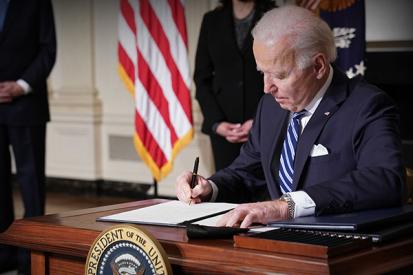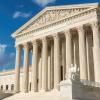Summary
This is a consolidation of multiple cases, including: The Daily Wire v. Occupational Safety and Health Administration,The Southern Baptist Theological Seminary v. Occupational Safety and Health Administration,State of Missouri v. Biden, and State of Florida v. Occupational Safety and Health Administration
The Biden administration issued a mandate via the Occupational Safety and Health Administration (OSHA) that requires all private employers of 100 or more employees to force unvaccinated employees to receive a COVID-19 vaccine, be subject to weekly testing and masking requirements, or face penalties such as fines or losing their job. ADF is representing multiple clients challenging the mandate. All cases challenging this mandate were consolidated in the U.S. Court of Appeals for the 6th Circuit.
On December 17, the 6th Circuit lifted the stay issued by the 5th Circuit which had effectively halted implementation of the OSHA vaccine mandate. ADF and others then asked the Supreme Court to intervene, and on January 13, it issued a per curiam opinion halting the implementation of the federal government’s COVID-19 vaccine mandate for private employers with 100 or more employees. The case now returns to the 6th Circuit where it will proceed and be decided on the merits.
Commentary
Case Documents
Answering Your Questions on the Private Employer Vaccine Mandate
Since the federal government announced this mandate last September, we at ADF have been inundated with questions from concerned Americans. You may have some questions yourself. Please find below answers to some of the most common questions we receive.
Note: These FAQs are not intended to provide legal advice to any person or entity. This is a fluid and rapidly changing area of the law. You should consult legal counsel to advise on your specific situation and to verify the below information.
-
Yes. The U.S. Constitution gives all lawmaking authority to Congress. The president cannot unilaterally make laws. No other executive agency can make laws; they can only issue regulations if given express authority from Congress. Congress has not given authority to the president or executive agencies to issue this unprecedented mandate. If politicians and bureaucrats are allowed to brazenly ignore the constitutional limits on their power whenever they please, our fundamental liberties are at risk.
-
Yes. President Biden has said repeatedly that he would not mandate the COVID-19 vaccine. Just weeks before he announced the mandate, President Biden’s press secretary said that such a national vaccine mandate was “not the role of the federal government.”
-
President Biden directed the Occupational Safety and Health Administration to issue an Emergency Temporary Standard (ETS), which it released on November 5. The ETS forces all employers with 100 or more employees to either: (a) require all employees to receive the vaccine, or (b) develop a policy requiring those employees who remain unvaccinated to submit to costly weekly testing and masking requirements. Practically, this will be enforced through OSHA, which is part of the Department of Labor.
-
The Supreme Court’s decision prevents the mandate from being enforced while the case proceeds. The case now returns to the 6th Circuit where it will be decided on the merits.
-
Yes, ADF filed four lawsuits challenging the private employer vaccine mandate. You can learn more information on ADF’s cases here.
-
Alliance Defending Freedom along with the Dhillon Law Group, Inc. represents The Daily Wire, a media company based in Tennessee. ADF also represents the Southern Baptist Theological Seminary, a second seminary, Christian Employers Alliance, HSLDA, two schools in Florida, and Bishop O’Gorman Catholic Schools in South Dakota.
-
On November 6, the 5th Circuit Court of Appeals preliminarily halted the ETS from going into effect due to “grave statutory and constitutional issues.” Then, on November 12, the same court issued another order preventing the ETS from going into effect “pending adequate judicial review.”
The court ordered “that OSHA take no steps to implement or enforce the Mandate until further court order.” The federal government requested that the various lawsuits be consolidated in one court. Through a random drawing conducting by a panel, the 6th Circuit Court of Appeals was selected on November 16 to hear all of the cases going forward.
However, on December 17, the 6th Circuit lifted the stay issued by the 5th Circuit. ADF and others then asked the Supreme Court to intervene.
-
On January 13, the Supreme Court entered a new stay stopping enforcement of the federal government’s COVID-19 vaccine mandate for private employers with 100 or more employees.
The Supreme Court correctly concluded that the federal administrative state has no authority to treat unvaccinated employees like workplace hazards and to compel employers to carry out the government’s unlawful national vaccine mandate.
The Supreme Court’s decision prevents the mandate from being enforced while the case proceeds. The case now returns to the 6th Circuit where it will be decided on the merits.
-
On January 25, the Biden administration announced that it is withdrawing its ETS which mandated COVID-19 vaccines for private employers with 100 or more employees. However, it is still pushing for a permanent rule regarding COVID-19 vaccines to be implemented through OSHA. ADF submitted a public comment opposing this action and will continue to oppose any effort of the government to overstep its constitutional bounds.
-
That’s a separate question, and not one at issue in the OSHA lawsuits. Our lawsuits contend that the federal government cannot unilaterally mandate vaccines for organizations with 100 or more employees. The Constitution gives lawmaking powers solely to Congress—not to the executive or judicial branches. So, for the president to assert that he can mandate a policy nation-wide is not only unconstitutional but a flagrant abuse of power.
-
Private employers can generally have mandatory job requirements so long as they don’t violate the law. But they must accommodate employees with sincere religious objections to vaccine requirements if it would not cause the employer an undue hardship. Government employers must also respect the constitutional rights of their employees and offer accommodations for employees with religious objections.
-
The Civil Rights Act of 1964 prohibits any private or government employers from discriminating against employees on the basis of religion. Under this law, employees are entitled to ask for religious exemptions to any of their employer’s directives that violate their sincerely held religious beliefs. If you think you may have a bona fide religious objection to a vaccine requirement, you can read more about religious exemptions here.
-
ADF takes no position on the vaccine itself. Some of our team members, and some of our clients’ employees, have chosen to be vaccinated while others have not. But ADF does take a position on the federal government mandating businesses and nonprofits require the vaccine for employees—it’s unconstitutional and it’s government overreach.
Case Profiles







